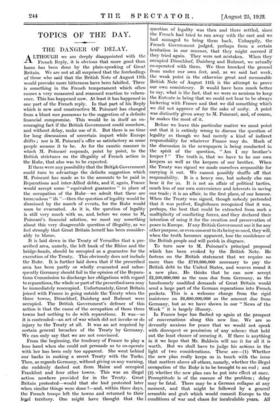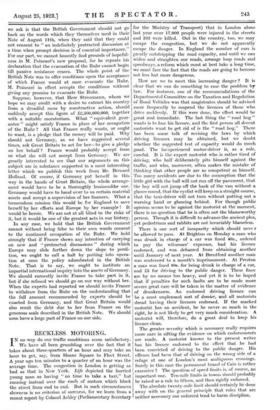TOPICS OF THE DAY.
THE DANGER OF DELAY.
ALTHOUGH we are deeply disappointed with the French Reply, it is obvious that more good than harm has been done by the plain-speaking of Great Britain. We are not at all surprised that the forebodings of those who said that the British Note of August 11th would provoke more bitterness have been falsified. There is something in the French temperament which often causes a very measured and reasoned reaction to vehem- ence. This has happened now. At least it has happened in one part of the French reply. In that part of his Reply which is new and constructive M. Poincare has changed from a blunt non possumuss to the suggestion of a definite financial compromise. This would be in itself an en- couraging fact if the British Government could somehow, and without delay, make use of it. But there is no time for long discussions of uncertain import while Europe drifts ; nor is M. Poincare's offer so satisfactory as some people assume it to be. As for the caustic manner in which M. Poineare responds, point by point, to the British strictures On the illegality of French action in the Ruhr, that also was to be expected.
If there were any possibility that the Briti,sh Government could turn to advantage the definite suggestion which M. Poincare has made as to the amounts to be paid in Reparations and inter-Allied debts, and if, again, France would accept some "equivalent guarantee" in place of the occupation of the Ruhr—we admit that these are tremendous" ifs "—then the question of legality would be dismissed by the march of events, for the Ruhr would soon be evacuated. As it is, the question of legality is still very much with us, and, before we come to M. Poincare's financial solution, we must say something about this very disagreeable question of illegality, as we feel strongly that Great Britain herself has been consider- ably to blame.
It is laid down in the Treaty of Versailles that a pre- scribed area, namely, the left bank of the Rhine and the bridge-heads, should be occupied as a guarantee for the execution of the Treaty. This obviously does not include the Ruhr. It is further laid down that if the prescribed area has been partly or wholly evacuated and subse- quently Germany should fail in the opinion of the Repara- tions Commission to discharge her obligations with regard to reparations, the whole or part of the prescribed area may be immediately reoccupied. Unfortunately, Great Britain joined with France in going outside the Treaty when the three towns, Diisseldorf, Duisberg and Ruhrort were occupied. The British Government's defence of this action is that the cause of the occupation of those three towns had nothing to do with reparations. It was—so it is contended—an act of war which did not invoke or do injury to the Treaty at all. It was an act required_ by certain general breaches of the Treaty by Germany. We can only say that we are not convinced.
From the beginning, the tendency of France to play a lone hand when she could not persuade us to co-operate with her has been only too apparent. She went behind our backs in making a secret Treaty with the Turks. Then, as regards Germany, without giving us any warning, she suddenly dashed out from Mainz and occupied Frankfort and four other towns. This was an illegal action nowhere provided for in the Treaty. Great Britain protested—would that she had protested later when similar things were done I—and, within three days, the French troops left the towns and returned to their legal territory. One might have thought that• the question of legality was then and there settled, since the French had tried to run away with the cart and we had managed to bring them back. Unhappily, the French Government judged, perhaps from a certain hesitation in our manner, that they might succeed if they tried again. They were not mistaken. When they occupied Dusseldorf, Duisberg and Ruhrort, we actually co-operated with them. We thus knocked the ground from under our own feet, and, as we said last week, the weak point in the otherwise great and memorable British Note of August 11th is the attempt to prove our own consistency. It would have been much better to say, what is the fact, that we were so anxious to keep the Entente in being that we could not bear to be always bickering with France and that we did something which we did not approve of for the sake of unity. A point was distinctly given away to M. Poincare, and, of course, he makes the most of it.
Before we leave this particular matter we must point out that it is entirely wrong to discuss the question of legality as though we had merely a kind of indirect responsibility for whatever France may do. Much of the discussion in the newspapers is being conducted in the spirit of the question, "Am I my brother's keeper ? " The truth is, that we have to be our own keepers as well as the keepers of our brother. When the Treaty was signed we made ourselves responsible for carrying it out. We cannot possibly shuffle off that responsibility. It is a heavy one, but nobody else can bear it for us. It is not an affair of political tactics, much less of our ov;rn convenience and interests in saving our trade ; it is an affair, in the first place, of our honour. When the Treaty was signed, though nobody pretended that it was perfect, Englishmen recognized that it was, perhaps, the best that could be extracted from such a multiplicity of conflicting forces, and they declared their intention of using it for the creation and preservation of peace in Europe. If any British Government use it for any other purpose, or even consent to its being so used, they will, when the truth becomes apparent, lose the confidence of the British people and will perish in disgrace.
To turn now to M. Poincare's principal proposal which has been evoked by the British Note. He fastens on the British statement that we require no more than the /710,000,000 necessary to pay the British debt to the United States, and weaves round it a new plan. He thinks that he can now• accept /2,500,000,000 as the sum due from Germany, as the handsomely modified demands of Great Britain would send a large part of the German reparations into French pockets. This is a welcome change from the rigid insistence on /6,600,000,000 as the amount due from Germany, but as we have shown in our "News of the Week" it is largely illusory.
In France hope has flashed up again at the prospect of conversations along this new line. We are so devoutly anxious for peace that we would not speak with disrespect or pessimism of any scheme that held out the least chance of securing it. If there is anything in it we hope that Mr. Baldwin will use it for all it is worth. - But we shall have to judge his actions in the light of two considerations. These are—(1) Whether the new plan really keeps us in touch with the issue that matters above all others, namely, whether the illegal occupation of the Ruhr is to be brought to an end ; and (2) whether the new plan can be put into effect at once. Promptitude is of the essence of the problem ; delay may be fatal. There may -be a German collapse at any moment, and that might be followed by a general scramble and grab which would commit Europe to the conditions of war and chaos for incalculable years. All we ask is that the British Government should not go back on the words which they themselves used in their Note of August 11th, when they said that they could not consent to "an indefinitely .protracted discussion at a time when prompt decision is of essential importance." For our part, we cannot honestly find grounds of hopeful- ness in M.. Poincare's new proposal, for he repeats his declaration that the evacuation of the Ruhr cannot begin till passive resistance ceases. The whole point of the British Note was to offer conditions upon the acceptance of which France would at once evacuate the Ruhr. M. Poincare in effect accepts the conditions without giving any promise to evacuate the Ruhr. Suppose, however, that Herr Stresemann, whom we hope we may credit with a desire to extract his country from a dreadful mess by constructive action, should suddenly accept this figure of £2,500,000,000, together with a suitable moratorium. What "equivalent guar- antee" might satisfy France in place of her occupation of the Ruhr ? All that France really wants, or , ought to want, is a pledge that the money will be paid. Why should not Germany, as we have suggested several times, ask Great Britain to act for her—to give a pledge on her. behalf ? France would. probably accept from us what she will not accept from Germany. We are greatly interested to see that our arguments on this subject are in substance supported in a most interesting letter which we publish this week from Mr. Bernard Holland. Of course, if Germany put herself in this way in the hands of Great Britain, the whole arrange- ment would have to be a thoroughly businesslike one. Germany would have to hand over to us certain material assets and accept a supervision of her finances. What a tremendous mission this would be for England to save herself by her efforts and Europe by her example ! It would be heroic. We are not at all blind to the risks of it, but it would be one of the greatest acts in our history.
In any case, we hold that the British Government cannot without being false to their own words consent to the continued occupation of the Ruhr. We hold strongly that if France shows any intention of carrying on new and " protracted discussions" during which Europe may slide further down the slope to perdi- tion, we ought to call a halt by putting into opera- tion at once the policy adumbrated in the British Note.. That is to say, we ought to institute an impartial international inquiry into the assets of Germany. We should earnestly invite France to take part in it, but if she refused we should go on our way without her. When the experts had reported we should invite France to withdraw from the Ruhr on the understanding that the full amount recommended by experts should be exacted from Germany, and that Great Britain would also remit the debt due to her from France on the generous scale described in the British Note. We should soon have a large part of France on our side.



































 Previous page
Previous page